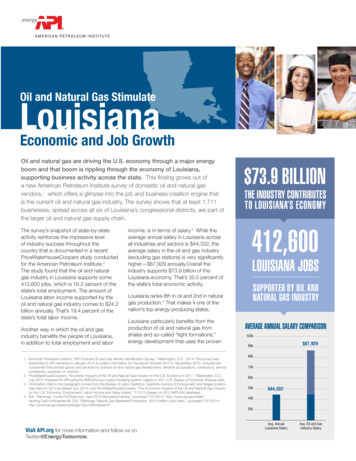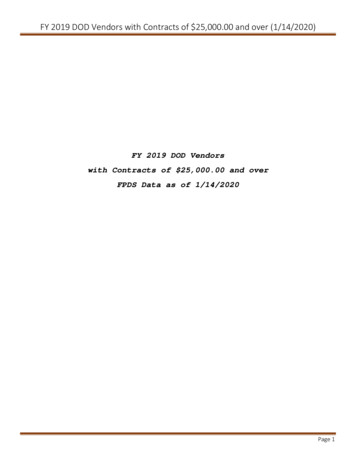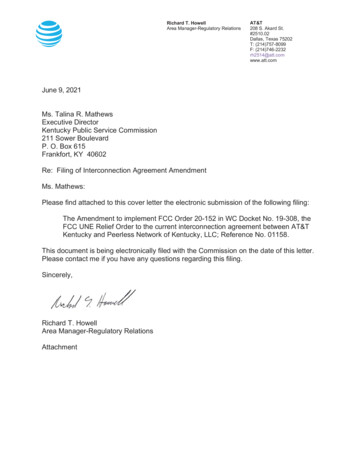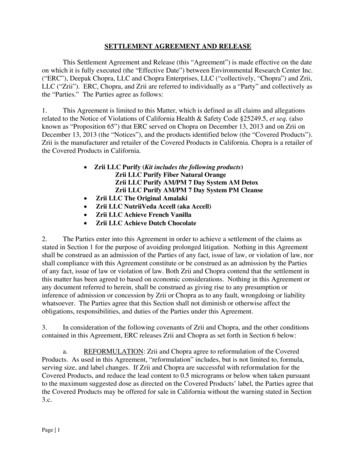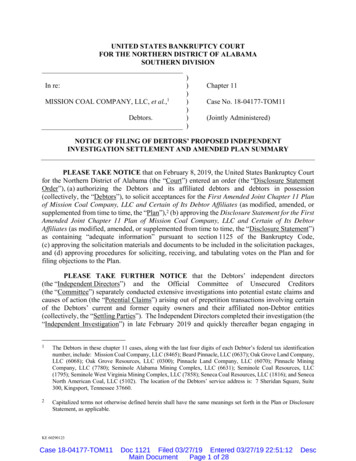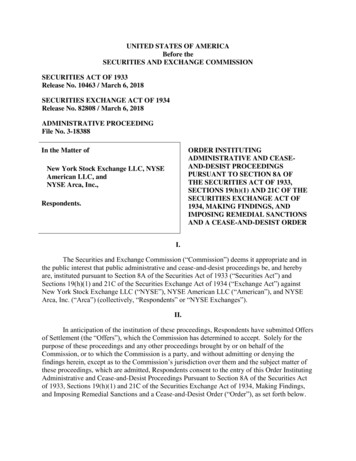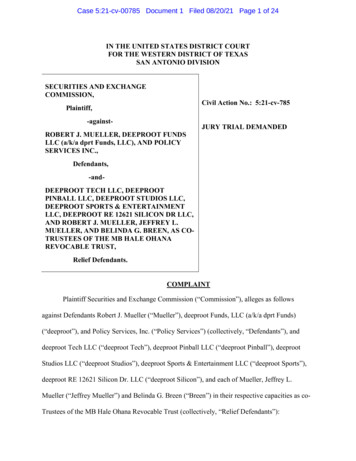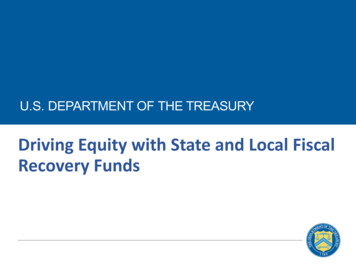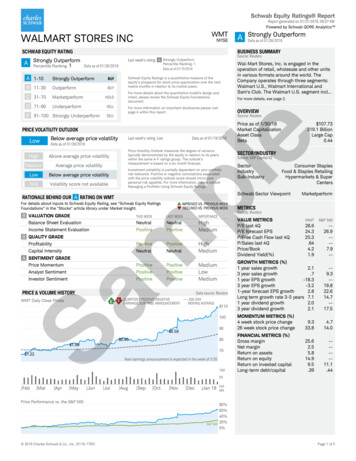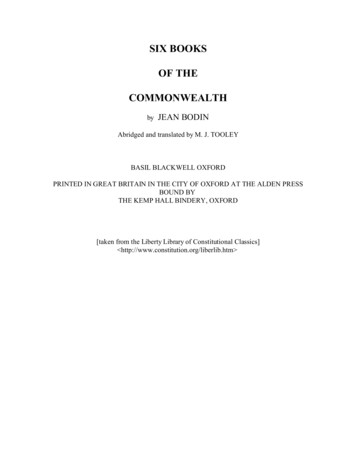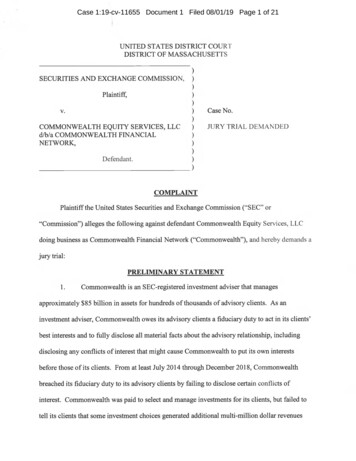
Transcription
Case 1:19-cv-11655 Document 1 Filed 08/01/19 Page 1 of 21UNITED STATES DISTRICT COURTDISTRICT OF MASSACHUSETTSSECURITIES AND EXCHANGE COMMISSION,Plaintiff,Case No.v.COMMONWEALTH EQUITY SERVICES, LLCd/b/a COMMONWEALTH FINANCIALNETWORK,JURY TRIAL DEMANDEDDefendant.COMPLAINTPlaintiff the United States Securities and Exchange Commission("SEC" or"Commission") alleges the following against defendant Commonwealth Equity Services, LLCdoing business as Commonwealth Financial Network("Commonwealth"), and hereby demands ajury trial:PRELIMINARY STATEMENTCommonwealth is an SEC-registered investment adviser that managesapproximately 85 billion in assets for hundreds ofthousands of advisory clients. As aninvestment adviser, Commonwealth owes its advisory clients a fiduciary duty to act in its clients'best interests and to fully disclose all material facts about the advisory relationship, includingdisclosing any conflicts ofinterest that might cause Commonwealth to put its own interestsbefore those ofits clients. From at least July 2014 through December 2018, Commonwealthbreached its fiduciary duty to its advisory clients by failing to disclose certain conflicts ofinterest. Commonwealth was paid to select and manage inveshnents for its clients, but failed totell its clients that some investment choices generated additional multi-million dollar revenues
Case 1:19-cv-11655 Document 1 Filed 08/01/19 Page 2 of 21for Commonwealth (referred to as "revenue sharing") while other similar investment choiceswould have generated much less, or no, additional revenue.2.The undisclosed conflicts ofinterest at issue in this case created incentives forCommonwealth to select and hold investments for advisory clients that financially benefitedCommonwealth over the interests of its clients, including the incentive to select and holdinvestments that were more expensive for clients.3.In particular, while Commonwealth disclosed it would receive revenue sharing forinvestments in a "no transaction fee" program offered by its clearing firm, it did not disclose thatthis revenue sharing arrangement meant that Commonwealth had differing financial incentivesdepending on which products it selected for its customers: (1)in some instances mutual fundshares offered through this program had at least one lower-cost share class that clients couldinvest in for which Commonwealth received less or no revenue sharing,(2) Commonwealth alsoreceived revenue sharing on certain mutual fund investments for which the broker charged atransaction fee, and (3)there were certain mutual funds for which Commonwealth did notreceive any revenue sharing and thus had an incentive not to select.4.By virtue ofthese failures to disclose material conflicts of interest, which aredetailed further herein, Commonwealth negligently breached its fiduciary duty to its advisoryclients in violation of Section 206(2)ofthe Investment Advisers Act of 1940("Advisers Act").Further, by failing to adopt and to implement written policies and procedures reasonablydesigned to ensure that Commonwealth identified and disclosed these conflicts ofinterest,Commonwealth violated Section 206(4)ofthe Advisers Act and Rule 206(4)-7 thereunder.5.The Commission seeks:(a)a permanent injunction prohibiting Commonwealthfrom further violations of the Advisers Act;(b)an order that Commonwealth disgorge its unjust2
Case 1:19-cv-11655 Document 1 Filed 08/01/19 Page 3 of 21enrichment, plus prejudgment interest; and (c)imposition of a civil penalty due to the nature ofCommonwealth's breach offiduciary obligation.JURISDICTION6.The Commission seeks a permanent injunction and disgorgement pursuant toSection 209(d)ofthe Advisers Act[15 U.S.C. § 80b-9(d)]. The Commission seeks theimposition of a civil penalty pursuant to Section 209(e)ofthe Advisers Act[15 U.S.C. § 80b9(e)].7.This Court has jurisdiction over this action pursuant to Sections 209(d), 209(e)and 214(a)ofthe Advisers Act[15 U.S.C. §§ 80b-9(d), 80b-9(e), 80b-14(a)]. Venue is proper inthis District because Commonwealth transacted business and maintains a principal place ofbusiness in Massachusetts.In connection with the conduct described in this Complaint, Commonwealthdirectly or indirectly made use ofthe mails or the means or instrumentalities ed in Waltham, Massachusetts, is registered with theCommission as both an investment adviser and broker-dealer. As of Apri12019,Commonwealth,in its role as an investment adviser, reported approximately 85 billion in assetsunder management, with approximately 60 billion ofthose assets owned by persons who arenon-high-net-worth retail clients, meaning clients with less than 1 million in assets undermanagement or a net worth ofless than 2 million. Commonwealth is also an introducingbroker, meaning that it accepts client orders, but has an arrangement with another broker, known3
Case 1:19-cv-11655 Document 1 Filed 08/01/19 Page 4 of 21as a clearing broker, to execute and clear client trades and maintain custody of the investmentsheld in Commonwealth's clients' accounts.OTHER RELEVANT ENTITIES10.National Financial Services, LLC("NFS"),is registered with the Commissionas abroker-dealer and investment adviser. Commonwealth contracted with NFS to maintaincustody of Commonwealth's clients' assets and to act as a clearing broker. NFS is an affiliate ofFidelity Investments, which is a sponsor of"Fidelity" mutual funds offered by NFS.STATEMENT OF FACTSI.Commonwealth's Advisory Services1 1.Commonwealth offers its investment advisory services through approximately2,300 investment adviser representatives("IARs") who are located throughout the United States,and through three Preferred Portfolio Services("PPS")programs, called PPS Custom,PPSSelect, and PPS Direct. It also provides clients advisory services through unaffiliated third-partyasset manager programs.12.Clients who receive investment advisory services through Commonwealth's PPSprograms or third-party asset manager programs generally pay management fees calculated as apercentage of their assets under management. These fees are periodically deducted from clients'advisory accounts.13.Commonwealth's largest PPS program is PPS Custom. As of the end of2017,Commonwealth advised 262,061 accounts with assets under management of approximately 71.7 billion in the PPS Custom program. In PPS Custom,IARs typically act as portfoliomanagers, with full investment discretion to develop custom investment portfolios for advisoryclients.4
Case 1:19-cv-11655 Document 1 Filed 08/01/19 Page 5 of 2114.The next largest PPS program is PPS Select. As ofthe end of 2017,Commonwealth advised 61,561 accounts with assets under management of approximately 6.8billion in the PPS Select program. In the PPS Select program, Commonwealth offers advisoryclients a variety of model portfolios of particular share classes ofpre-selected mutual funds.These model portfolios are created and managed on a discretionary basis by Commonwealth'sinternal Investment Management and Research Team. Once the Investment Team creates thesemodel portfolios, Commonwealth makes them available to its IARs and its client base throughthe PPS Select Program.15.The smallest ofthe three PPS programs is PPS Direct. As of the end of2017,Commonwealth advised 6,096 accounts with assets under management of approximately 2billion in the PPS Direct program. Similar to PPS Select, the Direct program offers clientsaccess to a variety of model portfolios. The model portfolios in PPS Direct, however, are notmanaged by Commonwealth. They are managed by one or more third-party portfolio managers.II.Mutual Fund Expenses and Share Classes16.Mutual funds are common investments for individuals. A mutual fund poolsmoney from many investors and invests the money in securities or other assets. A mutual fundhas various expenses that are paid from fund assets. These internal expenses are reflected in thefund's "expense ratio." Such expenses include fees paid to the adviser that manages the fund,operational expenses, and fees paid to the brokers that sell shares of, and provide services to, thefund. These are ongoing fees and expenses charged throughout the life ofthe mutual fundinvestment. Fees and expenses are an important consideration in selecting a mutual fundbecause these charges lower an investor's returns.5
Case 1:19-cv-11655 Document 1 Filed 08/01/19 Page 6 of 2117.A mutual fund frequently offers investors different "share classes." Each classwill invest in the same "pool" or portfolio of securities and other assets, but each class will havedifferent fees and expenses and, therefore, different returns. For example, some share classeshave higher expense ratios because they pay brokers more for selling or servicing that particularshare class. In contrast, other share classes ofthe same fund may have lower internal fees andexpenses. A single mutual fund will often have share classes with different expense ratios, withthe share classes that have higher expense ratios generally having lower returns than shareclasses with lower expense ratios. In other words, an individual investor may pay more, or less,for precisely the same mutual fund investment, depending on the share class.18.These internal fees and expenses are in addition to any fees a broker may directlycharge customers on particular share classes, such as transaction fees at the time of buying orselling the fund shares.19.Between 2014 and 2018, Commonwealth's Investment Team, which wasresponsible for creating and managing the model portfolios that Commonwealth offered toadvisory clients through the PPS Select program, had a practice of selecting the lowest-cost shareclass of mutual funds placed into the model portfolios. This practice was for the economicbenefit of clients who invested through the PPS Select program. By contrast, during this sameperiod, Commonwealth did not have a uniform practice of selecting the lowest-cost share classavailable of a mutual fund for clients in the much larger PPS Custom program.III.Commonwealth's Revenue Sharing Agreement with NFS20.Since at least 1998, Commonwealth has contracted with NFS to provide clearingservices for its advisory clients. Commonwealth requires substantially all ofits PPS advisoryclients to select NFS as the clearing broker for PPS investment accounts.D
Case 1:19-cv-11655 Document 1 Filed 08/01/19 Page 7 of 2121.When investors purchase or sell mutual fund shares through NFS, NFS maycharge a transaction fee.22.NFS has various programs through which investors can purchase and sell mutualfunds. Two programs are relevant here. First, NFS offers a "no transaction fee" program,through which investors can purchase and sell from a menu of mutual funds without atransaction fee. Second, NFS offers a "transaction fee" program, through which investors canpurchase and sell from a different menu of mutual funds, with a transaction fee.23.Many mutual funds pay NFS a recurring fee to have their fund shares offeredthrough these programs. NFS generally charges a mutual fund a higher fee for no transaction feemutual fund share classes than for transaction fee mutual fund share classes.24.Since at least March 2007, the clearing agreement between Commonwealth andNFS has provided that NFS will share this recurring fee, or mutual fund revenue, withCommonwealth based on Commonwealth's client assets invested in no transaction fee mutualfund share classes. A significant exception is that there is no revenue sharing forCommonwealth client assets invested Fidelity mutual funds.25.When Commonwealth purchased or sold no transaction fee mutual fund shareclasses for clients, clients did not pay a transaction fee, but they did pay fees to the mutual fundfor their share offund expenses for as long as they held the fund. In turn, the mutual fund paid aportion ofthese fees to NFS so that the fund would be available on NFS's platform. NFS thenshared a portion of the fees it received with Commonwealth.26.In September 2009, the clearing agreement between Commonwealth and NFSwas amended to add revenue sharing based on Commonwealth's client assets invested in certain7
Case 1:19-cv-11655 Document 1 Filed 08/01/19 Page 8 of 21transaction fee mutual fund share classes. Adding this category of Commonwealth client assetsrepresented a substantial increase in the amount of revenue sharing available to Commonwealth.27.When Commonwealth purchased transaction fee mutual fund share classes forclients, NFS charged a transaction fee for any purchase or sale of the fund shares, and, again, theclient paid ongoing fees to the mutual fund as their share offund expenses for as long as theyheld the fund. The mutual fund paid a portion ofthe ongoing fees to NFS so that the fund wouldbe available on NFS's platform. NFS then shared a portion of the ongoing fees it received withCommonwealth.28.In September 2014, Commonwealth and NFS executed an "Amended andRestated Fully Disclosed Clearing Agreement." Among other things, the 2014 agreementchanged the parties' method for calculating the amount ofrevenue sharing that NFS paid toCommonwealth for NFS's no transaction fee and transaction fee mutual fund programs.Effective September 23, 2014, NFS agreed to pay Commonwealth eighty percent(80%)of themutual fund revenue that NFS received if Commonwealth invested its clients' money into themutual fund share classes for which NFS shared revenue. Commonwealth continued not toreceive any revenue sharing on client investments in Fidelity mutual funds, whichCommonwealth can purchase for its clients without a transaction fee. Commonwealth continuesto receive monthly payments from NFS under this arrangement.29.The September 2014 agreement included terms that specifically addressedCommonwealth's fiduciary obligations to disclose conflicts of interest to its advisory clients.These additional terms included a representation by Commonwealth to NFS that Commonwealthhad made and would continue to make all appropriate disclosures to its advisory clients,including: (i)"[a]ny conflicts of interest that may arise in connection with the [revenue sharing],
Case 1:19-cv-11655 Document 1 Filed 08/01/19 Page 9 of 21including without limitation, any incentive arising in connection with [Commonwealth's] receipt(or prospective receipt) ofcompensation or other payments on balances or positions in mutualfunds to favor those types ofinvestments over others;" and (ii)"[t]he nature, scope and othermaterial terms ofthe payments that[Commonwealth] is eligible to receive pursuant to [therevenue sharing arrangement]."IV.Commonwealth's Receipt of Revenue Sharing from NFS Created SignificantConflicts of Interest Between Commonwealth and Its Clients30.As a result of Commonwealth's revenue sharing arrangement with NFS,Commonwealth's interests were in conflict with its clients. The revenue sharing arrangementcreated financial incentives for Commonwealth to invest clients in mutual funds in a manner thatwould lead to greater revenue sharing for Commonwealth.31.In particular, Commonwealth had an incentive to select and hold more expensivemutual funds for clients, and to select and hold more expensive mutual fund share classes whenlower-cost mutual funds were available for the same fund.32.When Commonwealth invested in a mutual fund for a client, it had more than onemutual fund to choose from,and could select or continue to hold mutual funds for which itwould receive less or no revenue sharing.33.Further, when Commonwealth chose to purchase or hold a particular mutual fundfor a client, it also sometimes had more than one mutual fund share class to choose from. Theseavailable share classes included those that charged a transaction fee and those that did not. Theno transaction fee share classes often had higher internal expenses and paid more revenuesharing to Commonwealth than the transaction fee share classes.34.Over time, mutual funds participating in NFS's mutual fund programs haveincluded more share classes with lower expenses. These share classes often result in
Case 1:19-cv-11655 Document 1 Filed 08/01/19 Page 10 of 21Commonwealth receiving less or even no revenue sharing payments from NFS based onCommonwealth's advisory clients' investments in such funds.35.For example,in 2016, Commonwealth invested clients in a certain non-Fidelitymutual fund, which had different share classes with different expense ratios and that wouldprovide different revenue sharing payments for Commonwealth. Three ofthe share classesexemplify the conflict Commonwealth faced.a. Class D, which was part of NFS's no transaction fee program, had the highestexpense ratio (0.79%) and resulted in Commonwealth receiving the greatestamount ofrevenue sharing(0.30% of client investment).b. Class P, which was part of NFS's transaction fee program, had the secondhighest expense ratio (0.55%), but paid less revenue sharing(0.08% ofclientinvestment)to Commonwealth.c. Class I had the lowest expense ratio (0.45%), and did not result inCommonwealth receiving any revenue sharing from NFS.36.In 2016, Commonwealth had approximately 174 million of its clients' assetsinvested in the "Class D" share class. This resulted in approximately 515,000 in revenuesharing payments to Commonwealth.37.Further, in October 2017, Commonwealth and NFS amended their clearingagreement to expand Commonwealth's mutual fund revenue sharing arrangement beyond the notransaction fee and transaction fee programs. The October 2017 amendment added a third NFSmutual fund program, one which offered institutional share classes with no transaction fee. Thisinstitutional share class program expanded the availability oflower-cost share class alternativesthat could be purchased outside NFS's no transaction fee program. After the October 201710
Case 1:19-cv-11655 Document 1 Filed 08/01/19 Page 11 of 21amendment, Commonwealth began receiving revenue sharing payments based on client assetsinvested in these institutional no transaction fee mutual fund share classes.V.Commonwealth Failed to Disclose its Conflicts of Interest to its Clients38.As an investment adviser, Commonwealth is a fiduciary for its advisory clients.As such, Commonwealth owes its clients an affirmative duty of utmost good faith, must providefull and fair disclosure of all material facts, and has an obligation to employ reasonable care toavoid misleading its clients. Commonwealth's duty to disclose all material facts includes a dutyto tell clients about actual or potential conflicts ofinterest that might incline Commonwealth torender investment advice that is not disinterested.39.Commonwealth made disclosures about some ofits revenue sharing arrangementswith third parties, including some ofits arrangements with NFS,in its SEC-mandated FormADV Part 2A,commonly referred to as a "brochure," and on its publicly-available website. Atleast annually, investment advisers like Commonwealth must file the brochure with theCommission and provide the brochure to advisory clients, including prospective clients prior toor concurrent with the execution of an advisory agreement. Brochures must include requireddisclosures about an investment adviser's business. At least once a year, from 2014 through2018, Commonwealth filed a brochure with the Commission, posted a copy ofthe latest brochureto its publicly-available website, and mailed or emailed every advisory client a summary ofmaterial changes to the brochure, along with information on how to receive the latest brochure orview it on apublicly-available website.40.From at least 2014 through March 2017, Commonwealth's website disclosuresabout the asset-based mutual fund revenue sharing with NFS were substantially the same as the11
Case 1:19-cv-11655 Document 1 Filed 08/01/19 Page 12 of 21disclosures Commonwealtk made in in its SEC-mandated client brochures. After March 2017,Commonwealth revised its SEC-mandated client brochures as detailed below.41.Commonwealth knew or should have known that it was required by law todisclose conflicts ofinterest to its advisory clients because, among other reasons, the instructionsto Form ADV provided such guidance.A.Commonwealth Failed to Tell Clients That It Had Incentives to InvestClients in More Expensive Mutual Funds In Order to Receive RevenueSharing,Including More Expensive Share Classes When Lower-Cost ShareClasses Were Available for the Same Fund42.From July 2014 through at least March 2018, certain ofthe mutual fund shareclasses offered through NFS's no transaction fee program to Commonwealth clients had higheron-going fees than other share classes ofthe same fund that were available, in at least somecircumstances, outside the program. These higher expense share classes generated higherrevenue sharing payments for Commonwealth than the alternative, lower-cost share classes thatpaid less or no revenue sharing to Commonwealth.43.Commonwealth's receipt ofrevenue sharing payments associated with the notransaction fee share class created a material conflict ofinterest because, in situations where thesame fund offered both a no transaction fee share class and one or more lower-cost alternativeshare classes, Commonwealth had an economic incentive to invest its clients' assets in the notransaction fee share class that would generate more revenue.44.From at least July 2014 through March 2017, Commonwealth disclosed that itreceived revenue sharing and, specifically as to revenue sharing from NFS,it stated:Additionally, NFS offers a"No Transaction Fee" program with more than 1,200no-load mutual funds. Participating mutual fund sponsors pay a fee to NFS toparticipate in this program, and a portion ofthis fee is shared withCommonwealth. None ofthese additional payments is paid to any advisors whosell these funds.12
Case 1:19-cv-11655 Document 1 Filed 08/01/19 Page 13 of 21Commonwealth did not, however, disclose that mutual funds that were part ofthe notransaction fee program for which it received revenue sharing from NFS were generallymore expensive for clients. Commonwealth also did not disclose that there wereinstances in which a mutual fund in NFS's no transaction fee program otherwise had alower-cost share class available, for which Commonwealth would receive less or norevenue sharing, and that it thus had conflicts ofinterest associated with those investmentdecisions.45.In light ofthe revenue sharing Commonwealth received from NFS based on clientinvestments in mutual funds in NFS's no transaction fee program, Commonwealth's disclosures,without more, were insufficient because they failed to disclose the existence of higher internalexpenses that were present in some no transaction fee mutual fund shares, the existence ofmutual fund share classes ofthe same funds with lower expenses, and the conflict ofinterestpresented by this set of circumstances. These disclosure failures were omissions of material factand were required to be disclosed to Commonwealth's advisory clients, and Commonwealthknew or should have known that it had a duty to disclose such information. Yet Commonwealthfailed to disclose any such information in, at least, its July 2014, February 2015, March 2015,Apri12015, September 2015, March 2016, or May 2016 brochures.46.In March 2017, Commonwealth amended its disclosure to state the following:Additionally, NFS offers an NTF [no transaction fee] program composed ofnoload mutual funds. Participating mutual fund sponsors pay a fee to NFS toparticipate in this program, and a portion ofthis fee is shared withCommonwealth. None ofthese additional payments is paid to any advisors whosell these funds. NTF mutual funds maybe purchased within an investmentadvisory account at no charge to the client. Clients, however, should be awarethat funds available through the NTF program may contain higher internalexpenses than mutual funds that do not participate in the NTF program and couldpresent a potential conflict ofinterest because Commonwealth may have an13
Case 1:19-cv-11655 Document 1 Filed 08/01/19 Page 14 of 21incentive to recommend those products or make investment decisions regardinginvestments that provide such compensation to Commonwealth.47.This amended disclosure was still deficient and misleading. First,Commonwealth described the conflict as merely "potential" and acknowledged only thatCommonwealth "may" have incentives to select more expensive investments based on itscompensation. In reality, Commonwealth had an actual conflict that did create those incentives.Yet Commonwealth failed to disclose such information in, at least, its March 2017 or June 2017brochures. Second, Commonwealth still did not disclose that there were instances in whichlower-cost share classes were available for a mutual fund in NFS's no transaction fee program,but that Commonwealth had an incentive to invest in the more expensive share classes for whichit received revenue sharing. Commonwealth failed to disclose such information in, at least, itsMarch 2017, June 2017, August 2017, or September 2017 brochures.48.Commonwealth knew or should have known that these conflicts of interest werematerial. Commonwealth in fact chose lower-cost share class alternatives for a subset of itsclients (those in the PPS Select program). Further, in July 2016, NFS provided Commonwealthwith an analysis showing that certain no transaction fee mutual fund shares in whichCommonwealth invested its advisory clients had lower-cost share class alternatives. However,despite being on notice ofthe existence oflower-cost share classes, Commonwealth failed todisclose its conflict ofinterest fully and fairly to its clients.49.Commonwealth did not disclose that no transaction fee program share classessometimes had higher internal expenses than other share classes ofthe same mutual fund, nor didit disclose the conflict created by Commonwealth's revenue sharing arrangements for clientassets that were invested through the no transaction fee program, until Maxch of2018.14
Case 1:19-cv-11655 Document 1 Filed 08/01/19 Page 15 of 21B.Commonwealth Failed to Tell Clients That It Received Transaction FeeRevenue Sharing50.Between July 2014 and December 2018, Commonwealth failed to disclose toclients that it received revenue sharing based on client assets invested in mutual funds in thetransaction fee program. Because Commonwealth failed to disclose that it received revenuefrom NFS for transaction fee mutual funds, Commonwealth also failed to disclose its financialincentive to invest its clients in transaction fee mutual funds that paid revenue sharing toCommonwealth instead of other funds or share classes ofthe same fund that did not pay revenuesharing.51.While Commonwealth's brochures and website mentioned revenue sharing withNFS,those disclosures were limited to the context ofthe no transaction fee program. Indeed,those affirmative disclosures falsely implied that Commonwealth did not receive revenue sharingon mutual fund investments in the transaction fee program.52.These disclosure failures were omissions of material fact, were required to bedisclosed to Commonwealth's advisory clients, and Commonwealth knew or should have knownthat it had a duty to disclose such information. Commonwealth failed to disclose suchinformation in, at least, its July 2014, February 2015, March 2015, Apri12015, September 2015,March 2016, May 2016, March 2017, June 2017, August 2017, September 2017, and March2018 brochures.53.Commonwealth did not disclose that it received revenue sharing from NFS basedupon client assets invested in transaction fee mutual fund share classes, and the associatedconflicts of interest, until December 2018.15
Case 1:19-cv-11655 Document 1 Filed 08/01/19 Page 16 of 21C.Commonwealth Failed to Tell Clients That There Were Certain MutualFund Investments That Did Not Pay Revenue Sharing to Commonwealth54.From at least July 2014 through December 2018, Commonwealth did not tellclients that NFS's revenue sharing arrangement with Commonwealth was limited to certainmutual funds or, in other words, that Commonwealth did not receive revenue sharing oninvestments in certain mutual funds.55.One example is Fidelity mutual funds. Commonwealth clients could purchase orsell Fidelity funds through NFS's no transaction fee program, but these investments did notresult in revenue sharing with Commonwealth. There were also other non-Fidelity families oftransaction fee funds that would not result in revenue sharing with Commonwealth.56.Commonwealth's receipt ofrevenue sharing for only certain mutual funds createdan economic incentive for Commonwealth to invest client assets in mutual funds that paidrevenue sharing over those that did not. Without this information, Commonwealth's clients didnot have sufficient information to assess Commonwealth's conflicts of interest or make aninformed judgment about whether to use Commonwealth as an adviser. Commonwealth'sfailures to disclose this information were omissions of material fact, Commonwealth wasrequired bylaw to disclose its conflicts ofinterest to its advisory clients, and Commonwealthknew or should have known that it had a duty to disclose such information. Commonwealthfailed to disclose such information in, at least, its July 2014, February 2015, March 2015, April2015, September 2015, March 2016, May 2016, March 2017, June 2017, August 2017,September 2017, and March 2018 brochures.57.In December 2018, Commonwealth disclosed for the first time that its revenuesharing with NFS was limited to non-Fidelity mutual funds.16
Case 1:19-cv-11655 Document 1 Filed 08/01/19 Page 17 of 21D.Revenue Sharing Commonwealth Received that Created Its UndisclosedConflicts of Interest58.Between July 2014 and March 2018, Commonwealth received approximately 58.7 million in revenue sharing payments from NFS related to advisory client assets invested inno transaction fee mutual fund share classes.59.Between July 2014 and December 2018, Commonwealth
National Financial Services, LLC ("NFS"), is registered with the Commission as abroker-dealer and investment adviser. Commonwealth contracted with NFS to maintain custody of Commonwealth's clients' assets and to act as a clearing broker. NFS is an affiliate of Fidelity Investments, which is a sponsor of "Fidelity" mutual funds offered by NFS.
